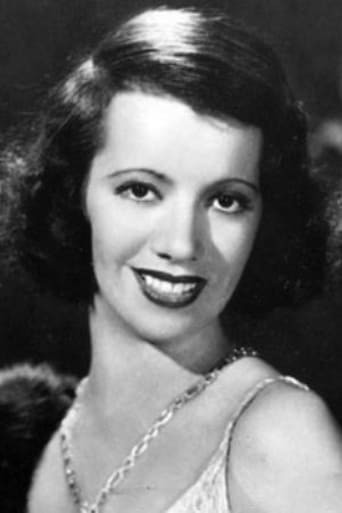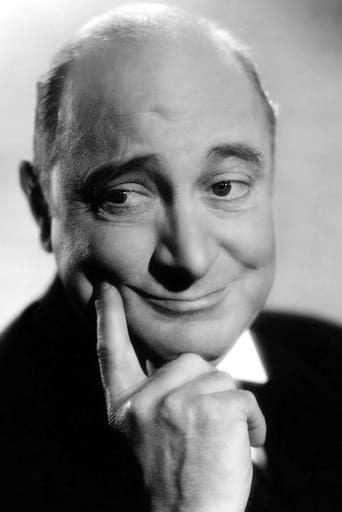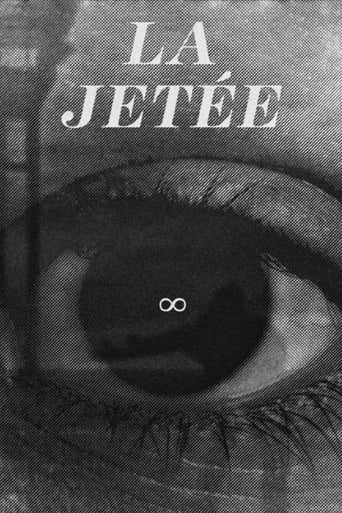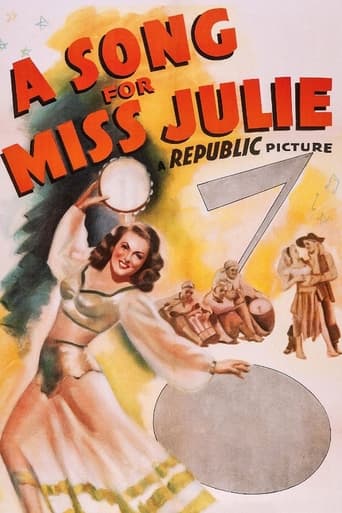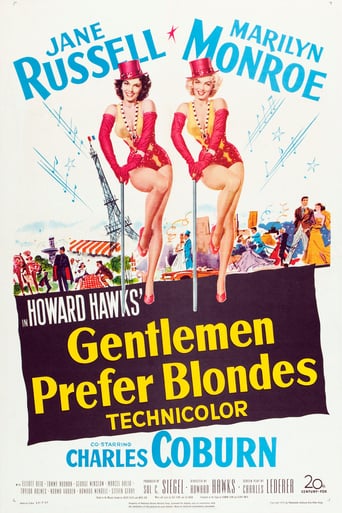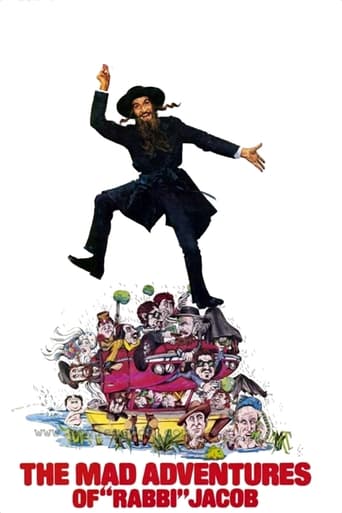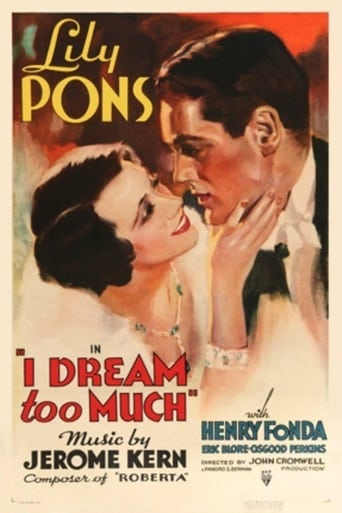
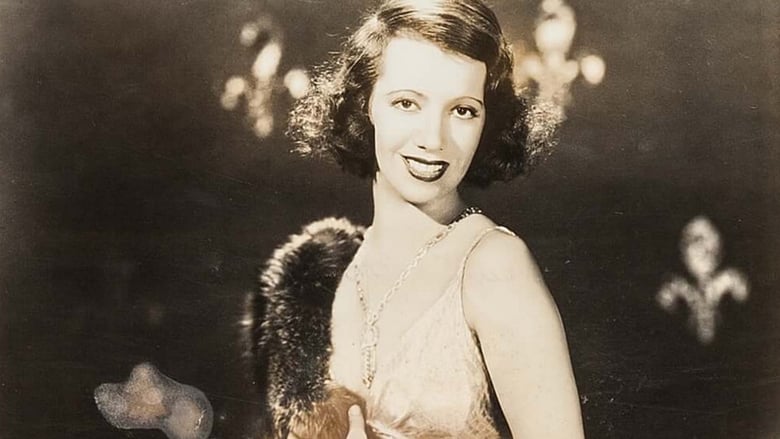
I Dream Too Much (1935)
Opera student Annette Monard meets composer Jonathan Street, and in a buoyant, alcohol-fueled evening, the couple marries. Sincerely falling in love, Jonathan encourages the talented Annette to sing — yet when his own attempt at an opera fails, Jonathan lashes out at Annette's success. Despite her husband's jealousy, Annette embarks on a successful career that allows her to secretly fund Jonathan's opera, bringing their marriage to a crisis.
Watch Trailer
Cast
Similar titles
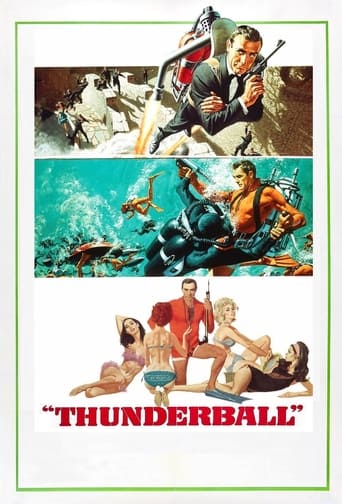

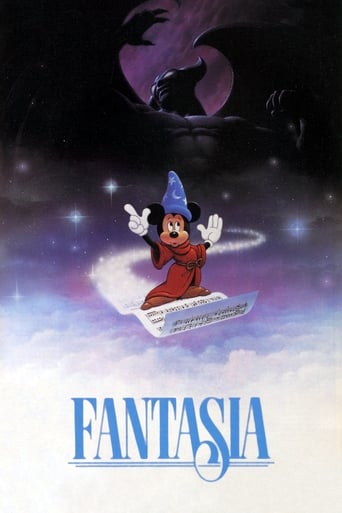
Reviews
Very very predictable, including the post credit scene !!!
Simply A Masterpiece
Exactly the movie you think it is, but not the movie you want it to be.
True to its essence, the characters remain on the same line and manage to entertain the viewer, each highlighting their own distinctive qualities or touches.
"I Dream Too Much," nicknamed "I Scream Too Much," is a 1935 film starring opera singer Lily Pons and Henry Fonda, who at this point in his life resembled Jane Fonda in a man's haircut. He was really at the height of his most adorable-ness. Fonda plays a composer named Johnny Street who marries a young woman, Annette, only to discover that she has an operatic voice. In attempting to push his opera, she sings some of it for the head of the opera company in Paris. He makes her a huge star and Johnny is stuck on the sidelines. When he finds out that she is paying for a production of his opera, he leaves her.This is a slight story no doubt prompted by the success of Jeanette MacDonald and Grace Moore that relies on the voice and personality of Lily Pons and the cuteness of Fonda. Eric Blore plays a neighbor who has a trained seal; he's there for comic relief, and he was always funny.Pons was a huge opera star who actually sang for the last time in 1972, when she was 74 years of age! She was tiny at a time when opera stars ran very big, she was very glamorous, and her timing was impeccable - she arrived in America during the Depression and saved the Metropolitan Opera from bankruptcy. Her signature aria was the Bell Song from Lakme, an opera done infrequently today if at all. In it, she wore a bare midriff costume and showed off her F above high C and her coloratura technique. She was an ideal Rosina, Gilda, Lucia, Linda di Chamonix, etc. Women singers in those days were trained a little differently than they are today, with back placement of the high notes. Pons' middle voice and extension above high C were lovely, but the notes from F to high C had a shrillness to them, at least in recording. Her speaking voice records shrilly as well.This is actually a sweet film that the actors make enjoyable. I could have done without the long, dragging number at the end, but it's a chance to see one of opera's legends and a very young Fonda.
The very concept of HENRY FONDA (the "aw shucks" guy from the sticks) as the husband of an opera singer (LILY PONS) is a weak idea that must have posed quite a problem for the scriptwriters. You have to wonder how audiences accepted this idea way back then because Fonda's youthful image was strictly the unsophisticated farm boy type.But that's not the only improbable thing about I DREAM TOO MUCH. The slight story is silly (as most musicals of the '30s were), and enjoyment of the film will depend entirely on whether or not you like to hear Miss Pons give out with her flute-like operatic voice on several well chosen arias. She certainly had an amazing vocal range and her rendition of "The Bell Song" from L'Akme is a highlight of this otherwise rather ordinary film.ERIC BLORE is there for a few standard comic routines and you can even catch a glimpse of LUCILLE BALL as a tourist in one of her early roles at RKO. But there's nothing much one can say about the film itself except that it gave audiences a chance to hear why Pons was such a favorite at the Met for a period amounting to something like thirty years. Otherwise, it's strictly routine stuff as romantic comedy, coming to life only when Pons sings.
Oh goody - Yet another movie wherein the husband feels threatened by his wife's talent, and can't deal with the blow to his ego when her career is more successful and she makes more money than he does. I really don't enjoy these kinds of stories. Inevitably the wife gives up her career to have babies and support her hubby's dreams.What I don't understand is, why can't Fonda and Pons' characters work TOGETHER and live as equals, each contributing to their income? After all, their skills complement each other, he being a composer, and she a singer. But no, after helping to make his show a hit, the little woman must retire and sing nothing but lullabies for their kids. Guess his fragile little ego can't stand to share the spotlight. Sigh.If you can stand the sexism, this film has some pleasant songs and fairly humorous moments - Fonda's drunk scenes, for instance. And I just love the part where he regrets marrying Pons the morning after, tells her that she's too skinny and he'll probably beat her, but relents when he discovers what a good cook she is. Haw! Now *that's* comedy! Um, yeah. There's just no escaping the sexism, is there?There's really not much to recommend about this film except the always amusing Eric Blore, delightful in his too-few scenes. He talks to a seal, he talks about a seal, he refuses to serve drinks as a waiter - it's all good. Lily Pons isn't the best actress - very limited range of facial expressions. But her vocal range was anything but limited ...apparently she could reach high *F*. Yowza. Coincidentally, that's just about the grade I'd give this movie. Nah, I'd give it a high C.
Because of Lily Pons' high soprano, this film was rudely nicknamed "I Scream Too Much." Actually, Pons had a lovely light voice with a girlish sound; her singing didn't sound like screaming. In spite of my love of serious music, I have to laugh at the nickname.Henry Fonda and Lily Pons? OK. Today, combining a young male romantic lead with an opera singer seems strange. In the mid 20th Century, classical music wasn't viewed suspiciously by most people, as it is now. No rock, rap, or hip hop yet (now THAT's what I call screaming).I hope this film will become available on DVD or tape - it's been years since I've seen it.
